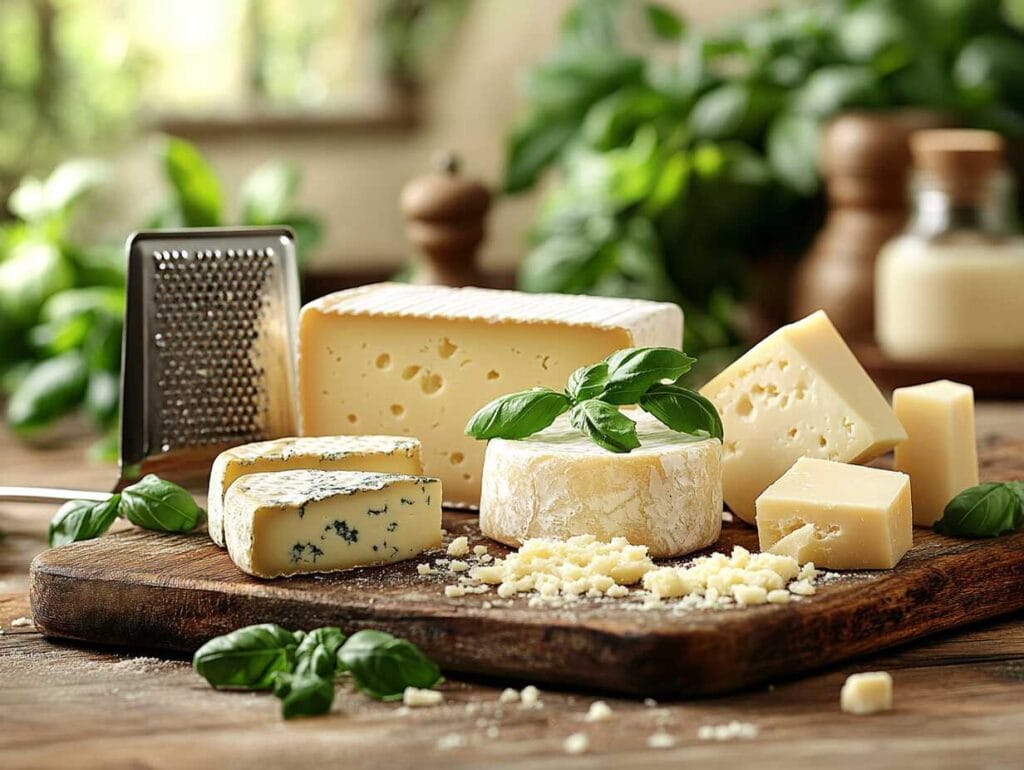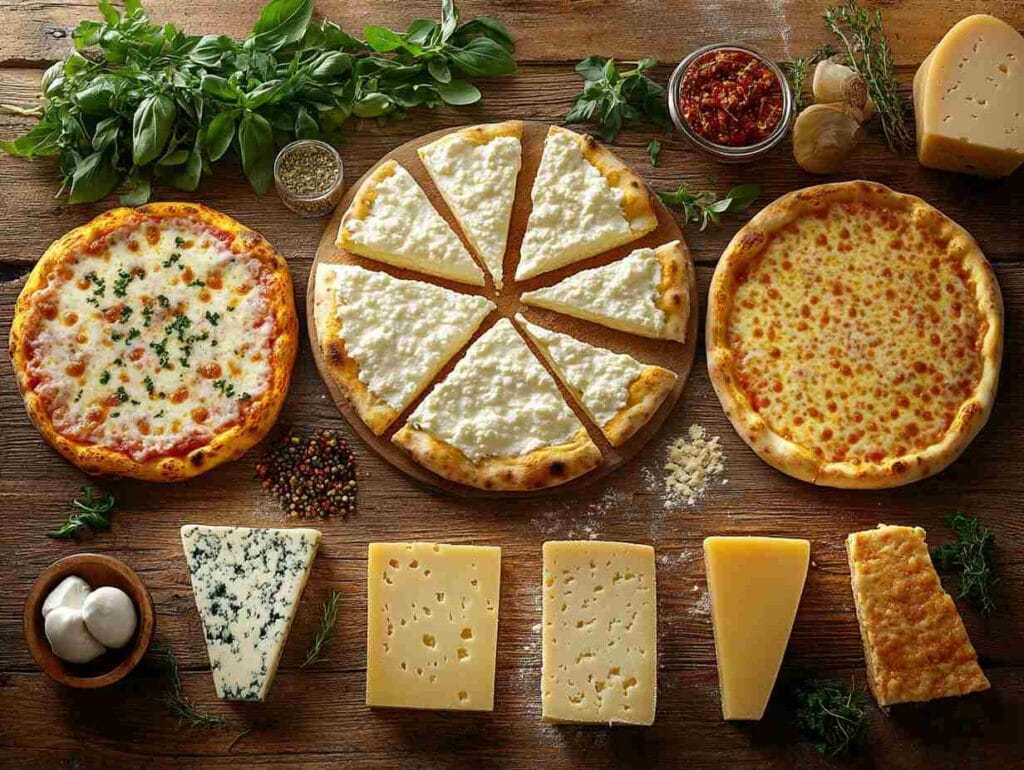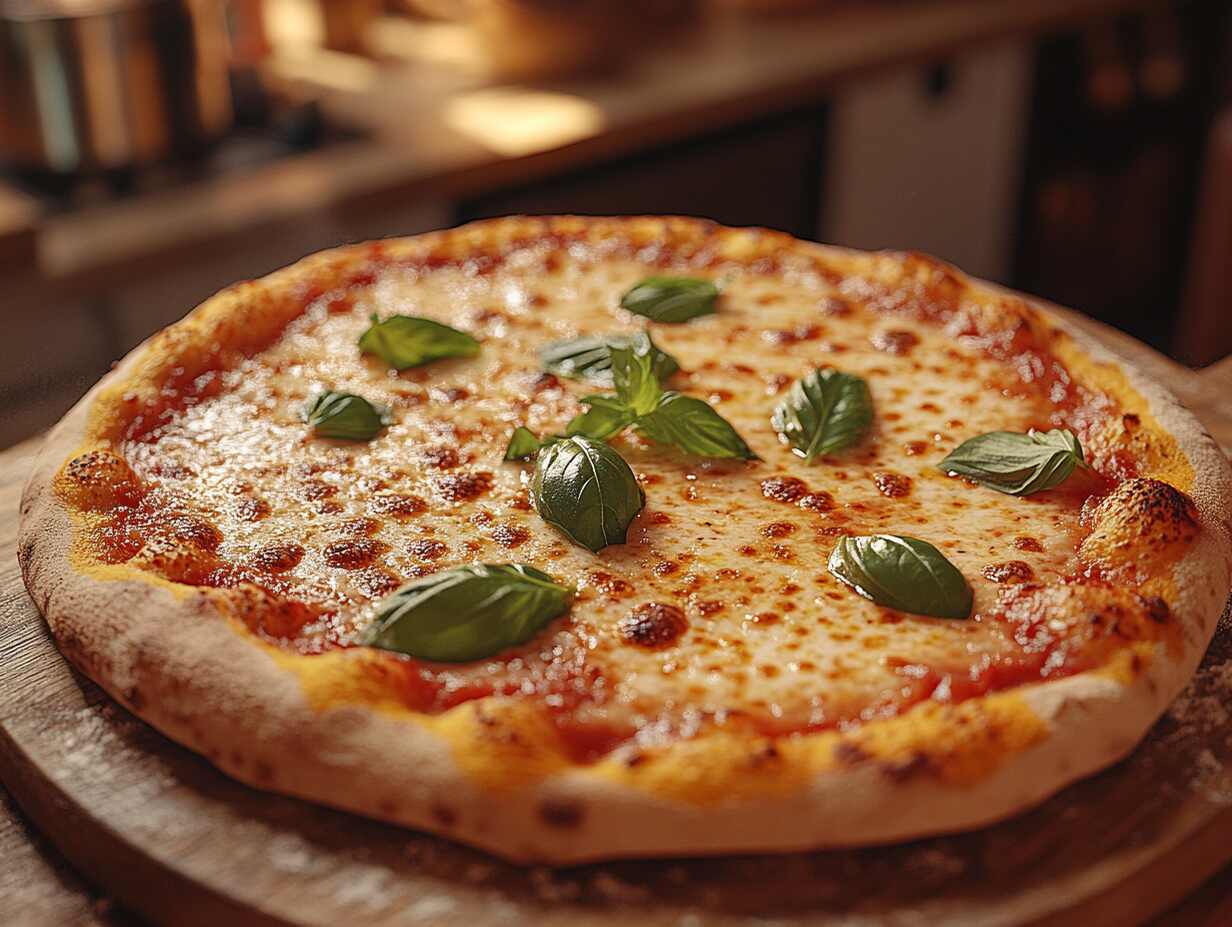Pizza is a universal favorite, loved by people of all ages and cultures. The combination of crispy crust, savory sauce, and melted cheese creates a culinary masterpiece that’s hard to resist. But if we were to pick one ingredient that makes pizza truly special, it would undoubtedly be cheese.
Have you ever wondered, what cheese works best on pizza? Choosing the right cheese is essential for creating the perfect pizza. While some cheeses are known for their creamy texture and perfect stretch, others bring unique flavors that elevate the taste of pizza to the next level. Understanding what cheese works best on pizza isn’t just about taste—it’s also about how it melts, stretches, and complements the toppings.
In this article, we’ll explore what cheese works best on pizza, how to use them, and even some lesser-known options that can take your pizza game to new heights. Let’s get started!
Table of Contents
Why Cheese Matters on Pizza
Cheese isn’t just an afterthought when making pizza—it’s a fundamental part of the recipe. Whether you prefer a classic Margherita or a fully loaded supreme pizza, understanding what cheese works best on pizza is key to creating the perfect flavor, texture, and appearance. Let’s take a closer look at why cheese matters so much.
The Role of Cheese in Pizza
Cheese is more than just a topping—it ties everything together. It adds a creamy richness that balances the acidity of the tomato sauce and the crunchiness of the crust. Beyond flavor, choosing what cheese works best on pizza ensures that your pizza delivers that gooey texture and golden-brown finish that’s essential to a great pizza experience.
When melted, cheese creates that iconic “cheese pull” effect that’s not just satisfying to look at but also fun to eat. Whether you’re grabbing a slice from your local pizzeria or making your own pie at home, a pizza without cheese just isn’t the same.
Characteristics of Good Pizza Cheese
When deciding what cheese works best on pizza, there are a few important qualities to consider:
- Meltability: The cheese should melt evenly and smoothly, covering the pizza in a luscious layer.
- Stretchiness: A good pizza cheese creates those delightful, Instagram-worthy cheese pulls.
- Flavor: The cheese should have enough flavor to stand out but not overpower the toppings.
- Moisture Content: A cheese that’s too wet can make the crust soggy, while a very dry cheese may not melt properly.
These characteristics are why certain cheeses are considered better for pizza than others. Understanding what cheese works best on pizza will help you make the right choice for your next pie.

The Best Cheeses for Pizza
Let’s dive into the cheeses that work best for making delicious pizza. Each cheese brings something unique to the table, whether it’s texture, flavor, or melting properties.
1. Mozzarella: The Classic Choice
When it comes to pizza cheese, mozzarella is king. It’s the most commonly used cheese for a reason—it melts perfectly, stretches beautifully, and has a mild flavor that complements almost any topping.
Types of Mozzarella Cheese
Mozzarella comes in different forms, each suited for specific styles of pizza:
- Fresh Mozzarella: Known for its creamy, soft texture and subtle flavor, fresh mozzarella is a staple in traditional Italian pizzas like Margherita. It’s usually sold in brine or water to keep it moist.
- Low-Moisture Mozzarella: This type of mozzarella is firmer and drier, making it perfect for American-style pizzas. It melts evenly and creates that golden-brown crust.
- Buffalo Mozzarella: Made from water buffalo milk, this variety has a richer, creamier texture and a slightly tangy taste. It’s a premium option for gourmet pizzas.
Why Mozzarella Works Best
Mozzarella’s versatility makes it the go-to cheese for pizzas of all kinds. Its mild flavor allows other ingredients to shine, while its excellent melting properties ensure an even, gooey layer of cheese on every slice. Whether you’re making a Neapolitan pizza or a New York slice, mozzarella is always a safe bet.
2. Parmesan: Adding a Punch of Flavor
Parmesan cheese isn’t typically used as the main cheese on pizza, but it’s an excellent choice for enhancing flavor. With its salty, nutty taste, Parmesan adds depth and complexity to your pizza.
How to Use Parmesan on Pizza
Parmesan is best used as a finishing cheese. Sprinkle it over your pizza after it’s baked to preserve its bold flavor. You can also mix it with mozzarella for a more layered taste. Its granular texture and rich umami flavor make Parmesan a favorite among pizza enthusiasts.
3. Cheddar: A Bold and Sharp Option
Cheddar cheese isn’t as traditional as mozzarella, but it’s gaining popularity for its sharp, tangy flavor. It doesn’t melt as smoothly as mozzarella, but when combined with other cheeses, it can add a unique twist to your pizza.
Blending Cheddar with Other Cheeses
Cheddar works best when paired with mozzarella. The mozzarella provides the stretch and melt, while the cheddar adds a bold, tangy kick. This combination is ideal for specialty pizzas like barbecue chicken or cheeseburger pizza.
4. Provolone: A Mild, Melty Cheese
Provolone is another excellent choice for pizza. It’s slightly tangy and has a creamy, smooth texture when melted. Provolone is often used in combination with mozzarella to create a richer, more complex flavor profile.
5. Ricotta: A Creamy Topping Cheese
Ricotta cheese is often used as a topping rather than a base cheese. Its creamy, slightly sweet flavor makes it perfect for gourmet pizzas featuring vegetables or cured meats. Dollops of ricotta can elevate a simple pizza into a luxurious treat.
Specialty Cheeses for Gourmet Pizzas
If you’re feeling adventurous, consider trying some specialty cheeses. These options aren’t as common as mozzarella or cheddar, but they can add unique flavors and textures to your pizza.
Goat Cheese: For Unique Flavor
Goat cheese is tangy and creamy, with a slightly earthy taste. It pairs wonderfully with sweet toppings like figs, honey, or caramelized onions. For a rustic, gourmet pizza, goat cheese is an excellent choice.
Blue Cheese: A Funky and Strong Option
Blue cheese is bold and flavorful, making it perfect for those who love strong flavors. It works best with sweet or savory toppings, such as pears, walnuts, or bacon, to balance its sharpness.
Vegan Cheese: A Plant-Based Alternative
For those who don’t eat dairy, vegan cheese is a great option. Modern vegan cheeses are made from nuts, soy, or coconut oil and are designed to melt and stretch like traditional cheese. Look for brands that specialize in vegan mozzarella for the best results.
How to Choose the Right Cheese for Your Pizza

With so many options available, how do you choose the right cheese? Here are a few tips to help you make the best decision.
Consider the Pizza Style
The type of pizza you’re making will influence your cheese choice. For example:
- A Neapolitan pizza calls for fresh mozzarella for its creamy texture and authentic Italian flavor.
- A Chicago deep-dish pizza benefits from a blend of low-moisture mozzarella and provolone for a hearty, cheesy layer.
Consider the Toppings
Think about how your cheese will interact with your toppings. Strong cheeses like blue cheese pair well with sweet or mild ingredients, while neutral cheeses like mozzarella can handle bold, spicy toppings.
Experiment with Blends
Some of the best pizzas use a combination of cheeses. For example, mixing mozzarella, parmesan, and provolone can create a rich, multi-dimensional flavor. Don’t be afraid to experiment with different blends to find your favorite combination.
FAQs
What Cheese Is Most Commonly Used for Pizza?
Mozzarella is by far the most popular cheese for pizza. It’s prized for its excellent melting ability, creamy texture, and neutral flavor, which pairs well with a variety of toppings. Mozzarella is the foundation of classic pizzas like Margherita and Neapolitan. Fresh mozzarella provides a soft, milky flavor, while low-moisture mozzarella creates a crispy, golden-brown finish. Whether you’re making a traditional or gourmet pizza, mozzarella remains the go-to choice.
For recipes using mozzarella in other creative ways, check out Ricotta Pizza: A Creamy Delight.
Can I Use Multiple Cheeses on One Pizza?
Absolutely! Combining multiple cheeses on one pizza adds layers of flavor and a rich texture. The classic “Four Cheese Pizza” often features mozzarella for its stretch, parmesan for its nutty flavor, ricotta for creaminess, and gorgonzola for a sharp bite. Mixing cheeses lets you balance their strengths—mild cheeses like mozzarella can be enhanced by the boldness of aged or sharp varieties. Just ensure that the cheeses have similar meltability to maintain a cohesive texture.
For a similar cheesy and satisfying dish, explore the Cheesy Ground Beef and Rice Casserole.
What Is the Best Cheese for Vegan Pizza?
For vegan pizza, plant-based cheeses that mimic mozzarella are the top choice. Modern vegan cheeses are made from cashews, almonds, coconut oil, or soy and are crafted to replicate the stretch and melt of traditional mozzarella. Popular options include vegan mozzarella shreds, nut-based parmesan, or vegan ricotta. For a homemade option, consider cashew-based cheese sauces blended with nutritional yeast for a creamy and tangy flavor. These alternatives allow vegans or those with dairy intolerances to enjoy delicious pizza without compromising on texture or taste.
Looking for more plant-based ideas? Try the Easy Zucchini Carrot Fritters Recipe for a healthy and flavorful dish.
How Do I Store Cheese for Pizza?
Proper storage is essential to preserve the quality and freshness of your cheese. Here are some tips for storing different types of cheese:
- Fresh Mozzarella: Keep it in its brine or water in the refrigerator to maintain moisture. Use it within 3–5 days of opening.
- Shredded Cheese: Store in an airtight container or resealable bag to prevent drying. For longer storage, freeze shredded cheese for up to three months, and thaw it in the fridge before use.
- Hard Cheeses (Parmesan, Pecorino): Wrap tightly in wax paper or parchment paper, then store in the fridge. This method prevents the cheese from absorbing other odors and helps it stay fresh longer.
- Soft Cheeses (Ricotta, Goat Cheese): Keep them in their original container and consume them quickly, as their shelf life is much shorter.
For more tips on storing ingredients, check out How Can I Thicken My Cream of Broccoli Soup?.
Can I Use Non-Traditional Cheeses on Pizza?
Yes, non-traditional cheeses can add exciting and unique flavors to your pizza. Here are some great options:
- Feta Cheese: Its salty, tangy flavor works well with Mediterranean-inspired toppings like olives, spinach, and sun-dried tomatoes.
- Smoked Gouda: The smoky flavor pairs beautifully with barbecue chicken, caramelized onions, or bacon.
- Gruyère: This nutty, creamy cheese complements toppings like mushrooms, ham, or caramelized shallots.
- Pepper Jack: For those who enjoy a spicy kick, pepper jack cheese is perfect, especially when paired with jalapeños or spicy sausage.
These cheeses let you experiment with gourmet and fusion-style pizzas, adding depth and variety to your pizza creations.
For more gourmet pairing ideas, visit What Is a Good Side to Have With Stuffed Peppers?.
Conclusion
Cheese is undeniably the soul of every great pizza. It transforms a simple dough and sauce base into a masterpiece of flavor and texture. While mozzarella remains the classic choice for its unmatched melting, stretch, and mild flavor, there’s no rule that says you can’t explore other options. Parmesan adds a salty punch, cheddar brings sharpness, and ricotta lends creaminess, while specialty cheeses like goat cheese or blue cheese can take your pizza into gourmet territory.
Experimenting with cheese is one of the joys of making pizza. Whether you stick to a single cheese or create a custom blend, the key is to balance the flavors and textures to complement your toppings and crust. Mozzarella is a safe base, but don’t hesitate to mix it with other cheeses for added depth. For vegan pizza lovers, plant-based cheeses offer an excellent alternative, letting everyone enjoy a slice of cheesy goodness.
Lastly, remember that choosing the right cheese isn’t just about flavor—it’s also about how it melts and how it interacts with your other ingredients. The next time you make pizza, take some time to think about your cheese choice. With the right selection, you’ll create a pizza that’s not just good but unforgettable. So grab your favorite cheeses, preheat your oven, and get ready to enjoy the ultimate cheesy delight!

